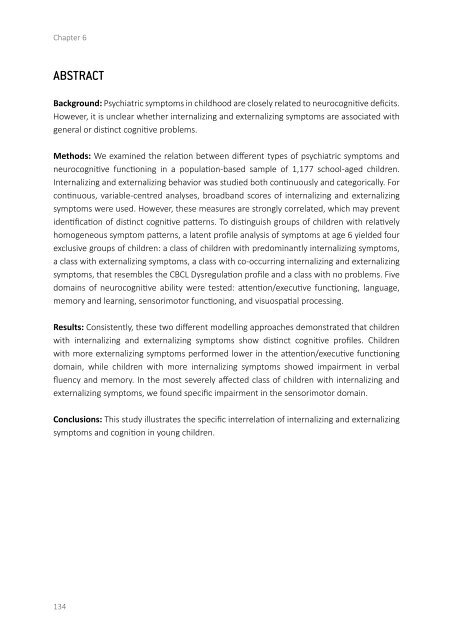On the Spectrum
2lm5UyR
2lm5UyR
You also want an ePaper? Increase the reach of your titles
YUMPU automatically turns print PDFs into web optimized ePapers that Google loves.
Chapter 6<br />
ABSTRACT<br />
Background: Psychiatric symptoms in childhood are closely related to neurocognitive deficits.<br />
However, it is unclear whe<strong>the</strong>r internalizing and externalizing symptoms are associated with<br />
general or distinct cognitive problems.<br />
Methods: We examined <strong>the</strong> relation between different types of psychiatric symptoms and<br />
neurocognitive functioning in a population-based sample of 1,177 school-aged children.<br />
Internalizing and externalizing behavior was studied both continuously and categorically. For<br />
continuous, variable-centred analyses, broadband scores of internalizing and externalizing<br />
symptoms were used. However, <strong>the</strong>se measures are strongly correlated, which may prevent<br />
identification of distinct cognitive patterns. To distinguish groups of children with relatively<br />
homogeneous symptom patterns, a latent profile analysis of symptoms at age 6 yielded four<br />
exclusive groups of children: a class of children with predominantly internalizing symptoms,<br />
a class with externalizing symptoms, a class with co-occurring internalizing and externalizing<br />
symptoms, that resembles <strong>the</strong> CBCL Dysregulation profile and a class with no problems. Five<br />
domains of neurocognitive ability were tested: attention/executive functioning, language,<br />
memory and learning, sensorimotor functioning, and visuospatial processing.<br />
Results: Consistently, <strong>the</strong>se two different modelling approaches demonstrated that children<br />
with internalizing and externalizing symptoms show distinct cognitive profiles. Children<br />
with more externalizing symptoms performed lower in <strong>the</strong> attention/executive functioning<br />
domain, while children with more internalizing symptoms showed impairment in verbal<br />
fluency and memory. In <strong>the</strong> most severely affected class of children with internalizing and<br />
externalizing symptoms, we found specific impairment in <strong>the</strong> sensorimotor domain.<br />
Conclusions: This study illustrates <strong>the</strong> specific interrelation of internalizing and externalizing<br />
symptoms and cognition in young children.<br />
134


